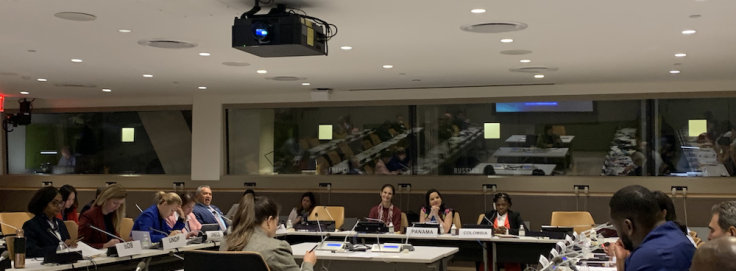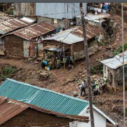
Search
‘People are never an abstraction’: Leaders at UNGA discuss how to leverage MPI to advance the 2030 Agenda

20 September 2023 – The Multidimensional Poverty Peer Network (MPPN), the Republic of Panama, and the United Nations Conference on Trade and Development (UNCTAD) co-hosted a high-level in person side-event at the 78th United Nations General Assembly on Wednesday 20 September convening world leaders and policymakers to discuss the topic ‘Leveraging the Multidimensional Poverty Index to Advance Interlinked SDGs’.
At the half-way point to the SDGs, the event profiled the experiences of leaders in using MPIs as an integral part of a rescue plan for people and planet.
MPI – a key ingredient
Secretary-General of UNCTAD, Dr Rebeca Grynspan, opened the event calling for ‘a paradigm shift’ in the approach to global development and asserting that MPI should be ‘at the centre of that debate’. The Secretary-General highlighted the MPI as a ‘key ingredient’ in this paradigm shift with its capacity to measure multiple factors of poverty. She described how the MPI tells a story and offers a trajectory allowing policymakers to see how individuals and communities are being disempowered. The Secretary-General stated that the MPI offers guidance for integrated, multisectoral solutions, pointing to a recent exercise in SDG Costing which has identified six transition pathways reflecting synergies worth tens of billions of dollars. To achieve the 2030 Agenda, she called on prioritising data collection, focusing on international cooperation, and using the MPI as a beacon to highlight further pragmatic synergies for interventions and investment.
Disaggregation and granular detail at the local level emerged as a clear priority among participants in this year’s Side Event. On behalf of the President of Panama, Mr Laurentino Cortizo Cohen, the Minister of Social Development, Ms María Inés Castillo, described how Panama had iterated on their national MPI, introduced in 2017, to create an MPI for children and adolescents, and then a corregimiento-level MPI that analysed poverty at the level of the smallest political territorial unit and has fed into the Beehive Plan Strategy responsible for more than 7,000 interventions nationwide. The Minister reported Panama’s successful record in reducing hunger in areas of multidimensional poverty decreasing the undernourishment rate from 21.6% in 2004–2006 to 5.8% in 2019–21.
MPIs in practice – leaders share progress and plans
The leadership panel reflected a wide range of experiences from countries who were early adopters of MPI to countries developing nationally tailored MPIs for the first time. Across all, the desire for accurate and granular data to inform development plans and the targeting and monitoring of social programmes stood out.
Francia Elena Márquez Mina, Vice President, Colombia challenged the audience to respond to the needs of historically marginalised and excluded communities. She called for a restructuring of the global development model to address long-standing inequalities along race and gender lines. She emphasised the vital importance of disaggregated data at the local level to spotlight communities left behind and reflected, in particular, on how the SDGs do not have indicators that measure how structural racism affects groups such as indigenous peoples and people of African descent in Colombia.
Mr Suman Bery, Vice Chairperson, Niti Aayog, India, offered a success story reporting on India’s progress in reducing the headcount ratio of multidimensional poverty in India from 24.85% to 15% between 2015-16 and 2019-21, which is equivalent to 135 million people escaping multidimensional poverty. Reinforcing the observations about disaggregated estimates, Mr Bery reminded the audience how states and districts in India are the size of countries elsewhere in the world and how a state-level MPI was therefore vital for poverty measurement. He also highlighted the need for independent trustworthy data in the measurement of poverty pointing to India’s National Family Health Survey as an example.
Dr Obid Khakimov, Deputy Adviser to the President of Uzbekistan reported how Uzbekistan has been rapidly advancing the development of an MPI since 2022. Dr Khakimov spoke of how it is hoped that the MPI serves ‘as a barometer of real changes within the country over the next seven years’. Dr Khakimov described how Uzbekistan intends to report multidimensional poverty data under SDG Indicator 1.2.2 in the Global SDG Indicator Framework and looks forward to participating fully in the knowledge exchange between countries using MPIs offered by the Multidimensional Poverty Peer Network.
Mr Orlando Habet, Minister of Sustainable Development, Climate Change, and Disaster Risk Management, Belize, shared the experience of the Small Island Developing State. Mr Habet described how the dimensions of the MPI have informed Plan Belize: Medium Term Development Strategy which intends to widen access to priority areas including education, primary healthcare, land and housing. The Belize MPI, based on 2021 data and launched in March 2023, has identified that 35.7% of the population in Belize were living in multidimensionally poor households, on average deprived in 39% of the 17 weighted indicators. He listed how the Belize MPI had highlighted how rural communities, children, larger households, households with children, households with a head who was under- or unemployed, and households with a head that had completed up to primary education only, or under that level, were more likely to be multidimensionally poor. Higher levels were also seen among male headed households.
Dr Rosemarie Edillon, Undersecretary for Planning and Policy, National Economic Development Authority, Philippines updated attendees on the journey of the Philippines MPI since 2015 describing how from 2019–2022 the Philippines had increased the sample size of their survey twenty-five-fold to include more respondents and exact more reliable estimates – which will make the MPI representative of 81 provinces. The Philippines continues to pursue a multidimensional approach to social protection focusing on conditional cash transfer, tertiary education and universal health care. Dr Edillon reported how next year, the Philippines will conduct a Community-Based Monitoring System which will further refine their targeting, ensuring that the most deprived benefit from various programmes. They are refining their targeting and monitoring mechanisms to reduce multidimensional poverty and accelerate the SDGs.
Collaboration and determination
The Institutional panel then went on to express their intentions to accelerate the SDGs touching on the importance of inter-agency collaboration and collaboration with countries, the need to enhance data to fit the relevant context, and the proven capacity of the MPI to help underpin and guide programming.
Dr José Manuel Salazar-Xirinachs, Executive Secretary, ECLAC, highlighted how multidimensional poverty measures in Latin America and the Caribbean needed to address the specificities of middle-income countries and reported how ECLAC has been developing a Multidimensional Deprivation Index – which is based, like the MPI, on the Alkire-Foster method – and which introduces innovations such as the use of the ‘individual’ as a unit of identification instead of the household to better reflect poverty in the region.
Ms Tatiana Molcean, Executive Secretary, UNECE, stressed the importance of collaboration between international partners and centres of expertise of multidimensional poverty to identify synergies in policies that the co-Chair, Dr Grynspan, outlined at the start of the session. Ms Molcean emphasised that UNECE has promoted the multidimensional approach through their inter-governmental expert group on measuring poverty and inequality for the last decade. She highlighted the ‘joint work’ that UNECE has done with a workshop with the Oxford Poverty and Human Development Initiative in the UNDP Istanbul Regional Hub and the endorsement of UNECE’s guidance on poverty measurement which shows how to set up an MPI.
Dr Luis Felipe López-Calva, Global Director, Poverty and Equity Global Practice, World Bank, described the MPI as an ‘intellectual victory’ which can be turned into a powerful policy tool. He shared the announcement that the UNDP/OPHI Multidimensional Poverty Index will be included in the update to the World Bank’s World Development Indicators (WDI) this year to serve as a core indicator in the World Bank’s efforts to monitor global poverty. He also shared how the World Bank’s Country Poverty Assessments should include multidimensional poverty and that the Bank is working with OPHI and other partners to achieve this. He observed that the World Bank had seen that countries which use the Multidimensional Poverty Index as a policy coordination tool have been more successful in reducing multidimensional poverty than countries that use it only as a measurement tool and together with the MPPN called for actors to recognise that multidimensional poverty is not only about measurement but also ‘about how we change the way we do policy’.
Ms Ivana Zivkovic, Assistant Administrator and Regional Director of the Bureau for Europe and the Commonwealth of Independent States, UNDP, speaking on behalf of UNDP Administrator Achim Steiner spoke of how the MPI helps deliver on the pledge of ‘leaving no one behind’ by identifying who is experiencing multiple forms of deprivation, vulnerabilities, and discrimination. The MPI, she said, can help us move away from ‘single point solutions’ for poverty reduction. Ms Zivkovic pointed out how UNDP’s collaboration with OPHI and the World Bank has helped design MPIs in over 30 countries and encouraged the implementation of the findings from UNDP’s SDG Push reports using MPIs to ‘operationalize nationally tailored SDG accelerators’.
Dr Shantanu Mukherjee, Director, Economic Analysis and Policy Division, UNDESA, pronounced work by UNDESA as promoting ‘drastic, even revolutionary, change’. He described the MPI as a ‘quiet revolution […] giving quantitative comparable form to the lived realities of poor people’s lives.’ For UNDESA, he argued it was important to highlight how local action can reduce multidimensional poverty. He suggested that, in the future, leaders must continue making the case for access to quality services to motivate local action through healthy MPI competition and expand the MPI mindfully.
Dr Hiba Ahmed, Director General of the Islamic Solidarity Fund, Islamic Development Bank, spoke of how the COVID-19 crisis had created challenges for poverty reduction work in IsDB member countries where 29 of 57 member countries are considered poor, but that ‘giving up is not an option’. Dr Ahmed shared how in July 2022, the IsDB Group had endorsed a US$10.54 billion package to support the implementation of the Food Security Response Program (FSRP) in member countries to foster inclusive human development and effectively reduce or eradicate multidimensional poverty. Dr Ahmed also reported the Bank’s belief that financial resources need to be supported by data-driven research. She shared how IsDB have collaborated with OPHI to ensure evidence-based policy making. For example, a recent joint Child Poverty Brief found that 55% of people in IsDB member countries who are multidimensionally poor are children. Because of this, IsDB are focusing their education and health interventions on children’s needs. They have also used research on multidimensional poverty in Afghanistan to support the Afghanistan Humanitarian Trust Fund and design its interventions accordingly.
Ms Pilar Garrido, Director of the Development Co-operation Directorate, OECD, closed the event by sharing the role of the OECD in reducing multidimensional poverty. The OECD, motivated by ensuring wellbeing for all, has developed a ‘Wellbeing Framework’ which looks at a range of indicators that matter for people’s lives. Many of these indicators, she noted, overlap with the dimensions of the MPI. This work, as Garrido described, is firmly in line with the UN-led discussions in ‘going beyond GDP’. The OECD are soon to launch a ‘Wellbeing Knowledge Exchange’ platform for peer-learning and technical assistance.
This Side Event was organised by the Multidimensional Poverty Peer Network (MPPN), a network of senior policymakers from more than 60 countries and 19 international organizations focused on measuring and reducing multidimensional poverty.
Agenda
Co-Hosts
Dr Rebeca Grynspan, Secretary-General, UNCTAD
Ms María Inés Castillo, Minister of Social Development, Panama
Leadership Panel
H.E. Francia Elena Márquez Mina, Vice President, Colombia
Mr Suman Bery, Vice Chairperson, Niti Aayog, India
Dr Obid Khakimov, Deputy Adviser to the President of Uzbekistan
Mr Orlando Habet, Minister of Sustainable Development, Climate Change, and Disaster Risk Management, Belize
Dr Rosemarie Edillon, Undersecretary for Planning and Policy, National Economic Development Authority, Philippines
Institutional Panel
Dr José Manuel Salazar-Xirinachs, Executive Secretary, ECLAC
Ms Tatiana Molcean, Executive Secretary, UNECE
Dr Luis Felipe López-Calva, Global Director, Poverty and Equity Global Practice, World Bank
Ms Ivana Zivkovic, Assistant Administrator and Regional Director of the Bureau for Europe and the Commonwealth of Independent States, UNDP
Dr Shantanu Mukherjee, Director, Economic Analysis and Policy Division, UNDESA
Dr Hiba Ahmed, Director General, Islamic Solidarity Fund, Islamic Development Bank
Ms Pilar Garrido, Director of the Development Co-operation Directorate, OECD
Moderators
Sabina Alkire and Monica Pinilla, OPHI
















